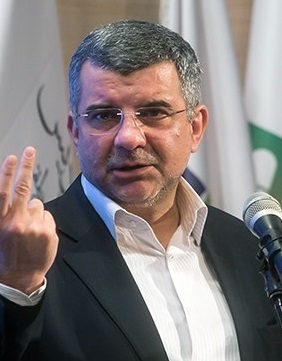Iraj Harirchi facts for kids
Quick facts for kids
Iraj Harirchi Tabrizi
|
|
|---|---|
|
ایرج حریرچی تبریزی
|
|

Harirchi in 2019
|
|
| Director of National Center for Fight with Coronavirus | |
| In office 24 February 2020 – 3 August 2021 |
|
| President | Hassan Rouhani |
| Deputy Minister of Health | |
| In office 22 October 2014 – 3 August 2021 |
|
| President | Hassan Rouhani |
| Personal details | |
| Born | 1966 (age 58–59) Tabriz, Iran |
Iraj Harirchi Tabrizi (Persian: ایرج حریرچی تبریزی) was born in 1966. He is an Iranian politician and a surgeon. A politician is someone who works in government. A surgeon is a doctor who performs operations.
He teaches at the Tehran University of Medical Sciences at the Tehran Cancer Institute. He also served as a deputy minister for health. This means he helped lead the country's health department.
His Role During the COVID-19 Pandemic
Getting Sick with COVID-19
During the COVID-19 pandemic in Iran, Iraj Harirchi played an important role. On February 25, 2020, he announced that he had been diagnosed with COVID-19. He then stayed at home to recover, which is called self-quarantining.
Just the day before, he had spoken at a press conference. He had denied claims that many people had died from COVID-19 in the city of Qom. During this conference, he was seen coughing and sweating. By March 12, 2020, he had fully recovered from the virus.
Views on Quarantines
During the global COVID-19 pandemic, Iraj Harirchi shared his views on quarantines. He said that Iran was against quarantines. He believed they were an old method, from before the First World War. He compared them to methods used for diseases like the plague or cholera.
This statement caused a lot of discussion. Many people in universities and on social media disagreed with his view. They felt that quarantines were still important for stopping the spread of new diseases.

